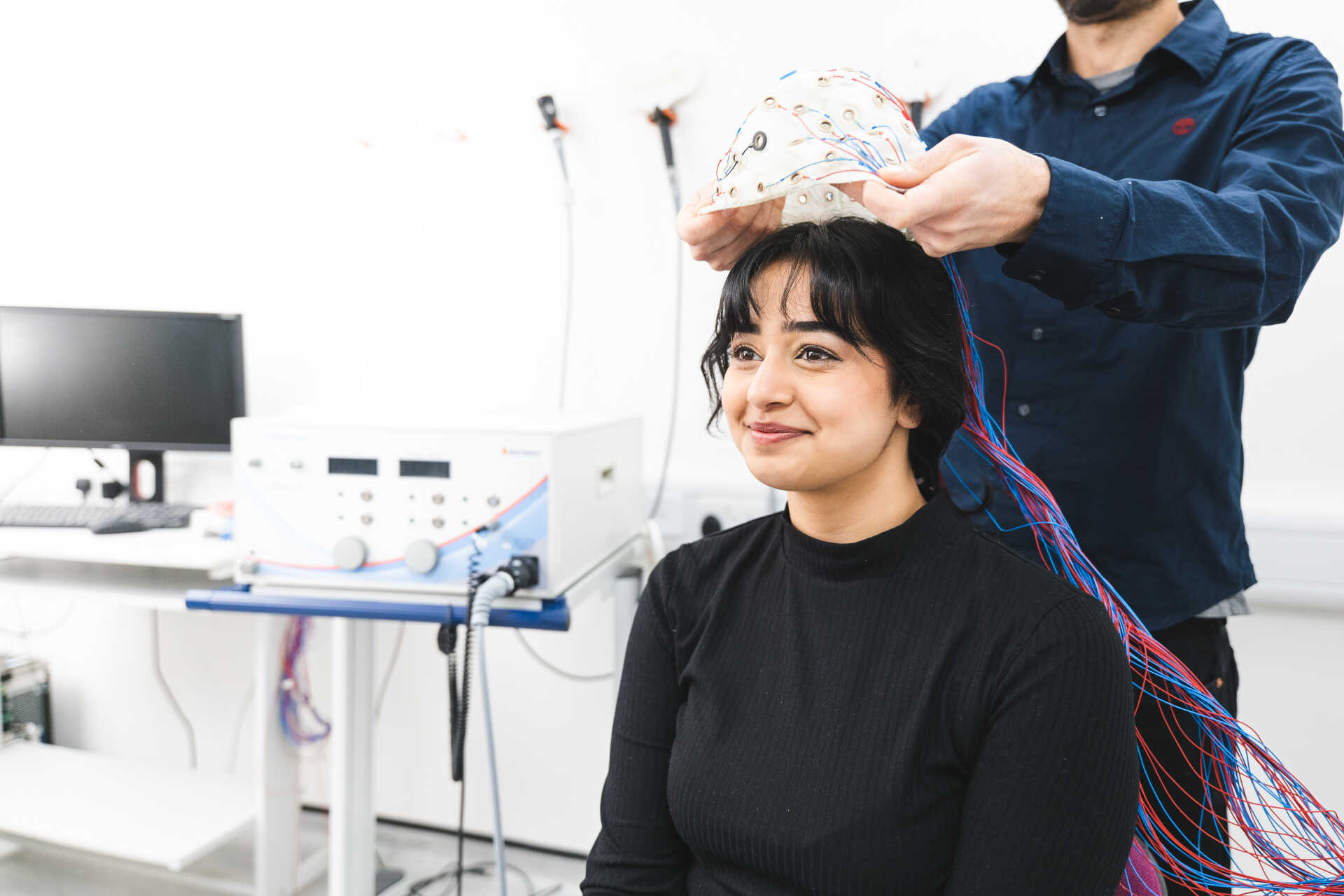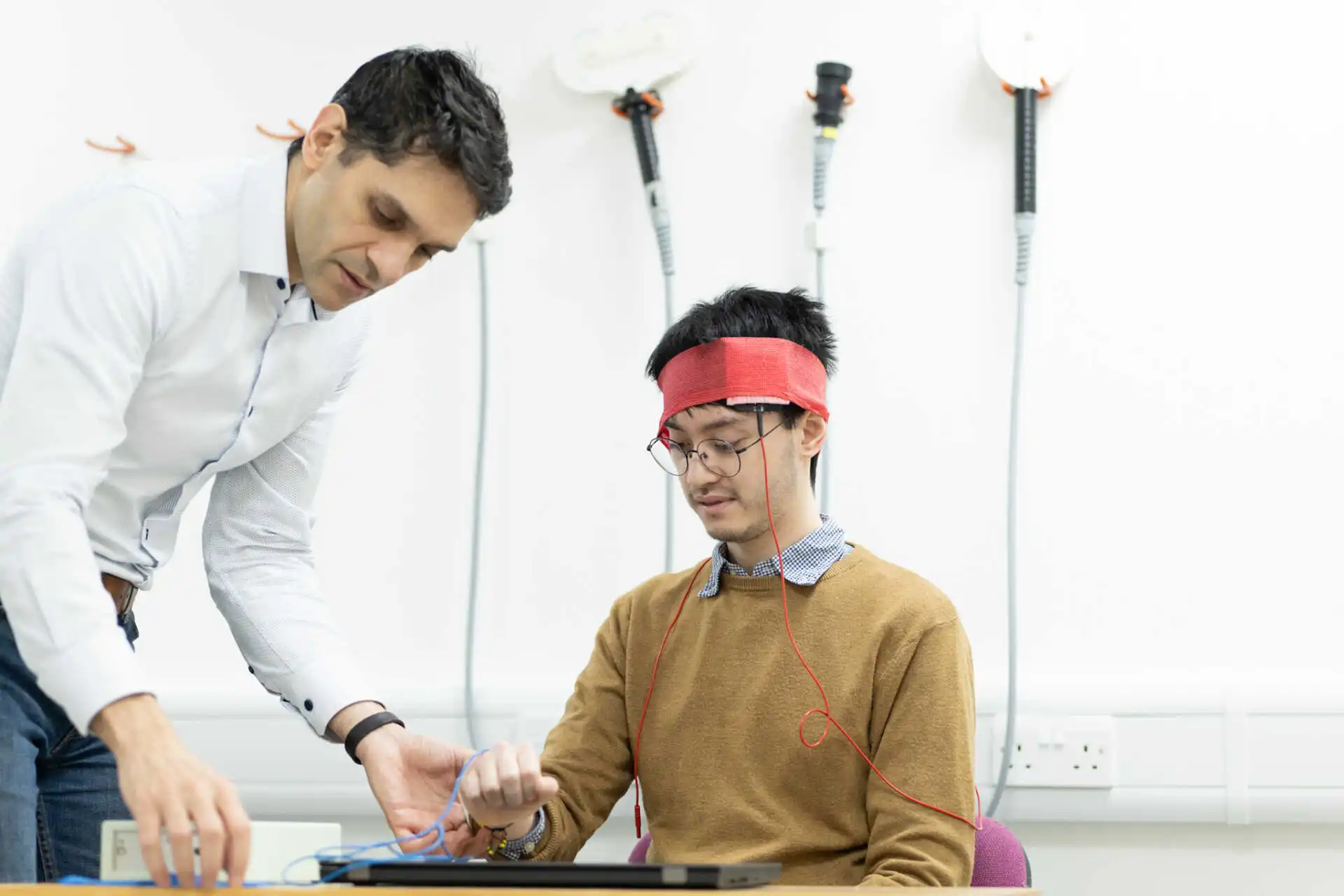Psychology with Forensic Psychology
Gain an understanding of human behaviour and open doors to a wide range of careers.

Gain an understanding of human behaviour and open doors to a wide range of careers.
Why do people commit crime? How are victims affected by crime? On our Psychology with Forensic Psychology degree, you will apply psychological theories, methods and processes to the study of criminal behaviour and the justice system.
Our British Psychological Society (BPS) accredited degree enables you to confront the issues that humans face with psychology's scientific principles. We give you the tools to develop your own ideas on criminal behaviour, explore how to reduce offending and understand victim responses to offending behaviour.

You'll have accesss to excellent industry-standard laboratory and field research facilities as well as modern teaching spaces.
Following the REF 2021, Psychology at Kent was ranked in the Top 50 in the world and 6th in the UK in the Times Higher Education.

You’ll become part of Kent's Centre of Research and Education in Forensic Psychology (CORE-FP)
We have 25 years’ continuous accreditation by The British Psychological Society.

The University will consider applications from students offering a wide range of qualifications. Click below to find out more. Please also see our general entry requirements.
ABB
Distinction, Distinction, Merit
128 tariff points - typically H5, H6, H6 or equivalent
Mathematics grade C or 4
Pass the University of Kent International Foundation Programme.
The University will consider applicants holding T level qualifications in subjects closely aligned to the course.
Obtain Access to HE Diploma with 45 at level 3 Credits with 18 credits at Distinction and 24 credits at Merit
The following modules are what students typically study, but this may change year to year in response to new developments and innovations.
What do you need to know to do well studying psychology at university? How can you best demonstrate and articulate your abilities throughout your studies and beyond? You'll gain essential information and opportunities to develop skills that will see you through the next years of your course. From academic writing to self-reflection and career planning, this modules gives you a thorough grounding in how to learn effectively and independently, and to use this learning to think and write like a psychologist.
How do psychologists generate knowledge? How can we use scientific methods to better understand human behaviour? In this module, you will learn the essentials of the scientific method, and how we can use this to design psychology experiments effectively. Through a critical examination of classic studies in psychology and seeing how they can be updated with modern methods, you will develop essential critical thinking skills that will help you understand the history and future of the study of psychology. This module will help you understand how to operationalise and measure variables, and how different types of data can be analysed.
You'll start on an in-depth journey into cognitive and biological psychology, introducing you to the foundational theories, methodologies, and critical issues within these fields. Starting with the history and development of psychology as a science, you'll navigate through the complexities of the brain and nervous system, delving into the cognitive processes behind learning, memory, and decision-making, and explores the realms of sensation, perception, and multisensory integration.
Students will also examine the nuances of psychopathology, including the nature and treatment of psychological disorders, and the psychological aspects of social cognition, sleep, and dreaming. Through a blend of historical context and contemporary research, you'll be equipped with a thorough understanding of the mechanisms underlying human behaviour and mental processes, laying a solid foundation for further study in psychology.
Each lecture within the module is designed to not only impart theoretical knowledge but also to encourage you to critically engage with current research, methodologies, and debates in the field of psychology. Through this comprehensive programme, you are equipped with a deep understanding of the cognitive and biological bases of human behaviour, preparing you for further study or careers in psychology and related disciplines.
A fundamental part of being a psychologist is using data to get answers to questions about how people think and behave. You'll build on what you have learned about psychology and science in Research Methods – Science and Psychology, exploring how to use generic and specialist software to produce descriptive statistics and test hypotheses. You'll also learn how to present your findings in graphical and written form in line with professional requirements to allow you to communicate your findings to a range of audiences. You'll develop an understanding of which types of tests can be used on which types of data, and what conclusions can be drawn from these tests. These essential skills will help you to think and communicate like a psychologist.
We’ve all seen criminal profilers on tv shows and in film. But what role does psychology actually play in crime investigation? In your lectures, you'll delve into the intersection of psychology and investigation. You'll learn the historical context of psychology's involvement in the criminal justice system and examine society’s enduring interest in criminal behaviour and 'true crime'. We’ll critically explore the idea of being able to profile people who commit crime, looking at a variety of different approaches to profiling.
But what about when we get it wrong? You’ll be taught about biases and other psychological process involved in miscarriages of justice. We’ll also look beyond crime investigation at the other ways in which psychology plays a role in the criminal justice system. In module workshops, you’ll take on the role of investigator. We want you to become experts in searching out and evaluating information. Working collaboratively, you'll have the opportunity to select and analyse cold cases. As you progress, you'll use your developing psychological knowledge to generate novel insights into these long unsolved cases.
Why are some people attracted to each other? Why are some of your friends more open to persuasion than others? What motivates people to help or harm others?
Learn how people think, feel and act in relation to themselves, others, and the world around them. From personal choices to group conflicts, you'll gain a solid understanding of people and groups, and learn about the psychological underpinnings of the brighter and darker sides of human nature. Using fascinating real-life examples, we'll introduce you to classic concepts and research as well as emerging areas in personality and social psychology. You'll learn about their relevance to everyday life, and inevitably, you'll learn something about yourself, as you develop the ability to critically reflect upon psychological ideas and research findings and identify some of the most pressing questions related to human behaviour and the social world.
How do our early experiences shape us into the people we are today? Are we simply a product of our genetics or does the environment we grow up in impact the way we think and behave?
You'll gain knowledge of the crucial factors that influence us from before birth, through infancy and childhood, and into adolescence. Through engaging with key theories and methods you'll gain an in-depth understanding of how biological and cultural factors impact every child’s development, alongside developing key skills for a career in Psychology or further afield.
How do we study the brain and how it relates to cognition and behaviour? This module gives you grounding in methods, techniques and issues in cognitive neuroscience. It will focus on the biological bases of human behaviour (neural development and plasticity; anatomy and physiology of the nervous system), and on key cognitive processes such as perception, memory and higher levels of cognition with a particular focus on how these processes are instantiated in the brain.
You'll learn about the methods used to study and modulate these processes, such as the recording of physiological signals, brain-imaging, brain stimulation and psychopharmacology. During the seminars you'll gain familiarity with key contemporary research topics and methods in Cognitive and Biological Psychology and develop fundamental critical reflection skills through the discussion of scientific research articles. You'll have the opportunity to train in verbal presentation, a core skill to learn not only in academia but in almost all graduate careers.
Psychological tests from diagnostic measures, to personality tests, to tests of cognitive function have wide-ranging applications in areas including business, health, education and the law. They can be used to inform interventions at the individual, group, organisational and social levels, and are among the most important tools used by professional psychologists. We'll introduce you to some key psychological tests and how they can be used in real-world situations. You'll gain an understanding of how they are administered and scored, as well as developing a critical perspective on their use, learning how to make recommendations based on the results of these tests and to propose interventions related to them. You'll learn how to apply psychological concepts and tests, gaining this essential employability skill for anyone looking to work within the field of psychology.
In Conducting, Using and Evaluating Research, you'll gain experience of the research process from data collection through to the production of professional-standard research reports. You'll have the opportunity to work on both qualitative and quantitative data, and to understand the different ways in which these can be used to answer fundamental questions about human behaviour. Building on Making Sense of Psychological Data, you'll continue to learn how to apply and interpret statistical tests that will allow you to ask and answer more complex and interesting questions. You'll also develop essential skills around the critical reading of scientific research to help you write your practical reports.
Psychological tests from diagnostic measures, to personality tests, to tests of cognitive function have wide-ranging applications in areas including business, health, education and the law. They can be used to inform interventions at the individual, group, organisational and social levels, and are among the most important tools used by professional psychologists. You'll be introduced to some key psychological tests and learn how they can be used in real-world situations. You'll gain an understanding of how they are administered and scored, as well as developing a critical perspective on their use. You'll also learn how to make recommendations based on the results of these tests, and to propose interventions related to them. Learning how to apply psychological concepts and tests is an essential employability skill for anyone looking to work within the field of psychology.
To what extent are our thoughts and actions shaped by processes outside our awareness? Are we wrong to believe that we can act out of free will? You'll explore these questions to tackle a variety of current and/or critical topics in cognitive psychology/neuroscience.
The overarching theme focuses on free will and metacognition, looking in particular at the extent to which we control, or feel we control, our thoughts and behaviour. You’ll discuss research that has used a variety of methods, including behavioural, animal and neuroimaging techniques. Practical applications and relevance to everyday understanding of behaviour is emphasised throughout. You will learn how to evaluate pieces of original research in terms of their findings, conceptual underpinnings and/or methodological choices. This will enable you to gain a deep understanding of the topic areas as well as important communication and critical analysis skills.
We are all unique, so why do we assume our experience and understanding of distress would be the same? How do factors like culture, religion or gender influence people’s perceptions of distress? What do cultures around the world have to say about the causes of distress and how we treat it?
Clinical Psychology practice and research have been criticised for being Eurocentric, individualist and focusing heavily on intra-psychic intervention. Research tells us that our current practice doesn’t work for everyone, so what are some of the alternatives? You’ll explore understandings of distress from other countries, other psychological perspectives (e.g. social justice approaches) and how individual factors such as religion, sexuality and culture may influence people’s perceptions of distress. This holistic approach and widened understanding makes you a better practitioner, able to serve more people and offer them more relevant and effective support.
For students interested in further study, or a research career, this module offers an opportunity for you to get experience of data collection at an advanced level. You will work in a research team under the supervision of an academic to collect data for your psychology project.
Working as part of a research team will allow you to develop professional and research skills ideal for further study. The exact nature of the research you undertake will vary depending on the project, but will likely require lab-based data collection. You will undertake supervision as a group, and work together to identify and evaluate evidence relevant to your project. This skills you develop through working in a research team help you stand out to employers, in whichever field or career you want to explore.
Modules are taught by weekly lectures, workshops, small group seminars and project supervision. The Psychology Statistics and Practical modules include laboratory practical sessions, statistics classes, computing classes and lectures in statistics and methodology.
Most modules are assessed by examination and coursework in equal measure. Both Stage 2 and 3 marks and, where appropriate, the marks for your year abroad or placement count towards your final degree result. Our assessment methods are varied and will include, but are not limited to, examinations, written assignments and essays, group work and oral presentations
For a student studying full time, each academic year of the programme will comprise 1200 learning hours which include both direct contact hours and private study hours. The precise breakdown of hours will be subject dependent and will vary according to modules.
Methods of assessment will vary according to subject specialism and individual modules.
Please refer to the individual module details under Course Structure.
For course aims and learning outcomes please see the course specification.
Our graduates currently have excellent graduate employment prospects, working in clinical, forensic and occupational psychology or in allied fields related to therapy, teaching, or social work. Many work in communication-focused roles in marketing, public relations and publishing.
Jobs our students have gone on to work after a clinical degree at Kent:
*The Government announced on 4 November 2024 that tuition fees in England for Home students will increase to £9,535 from £9,250 for the academic year 2025/26. This increase requires Parliamentary approval, which is expected to be given in early/mid 2025.
Tuition fees may be increased in the second and subsequent years of your course. Detailed information on possible future increases in tuition fees is contained in the Tuition Fees Increase Policy.
The University will assess your fee status as part of the application process. If you are uncertain about your fee status you may wish to seek advice from UKCISA before applying.
For details of when and how to pay fees and charges, please see our Student Finance Guide.
Students will require regular access to a desktop computer/laptop with an internet connection to use the University of Kent’s online resources and systems. Please see information about the minimum computer requirements for study.
Find out more about accommodation and living costs, plus general additional costs that you may pay when studying at Kent.
Kent offers generous financial support schemes to assist eligible undergraduate students during their studies. See our funding page for more details.

We have a range of subject-specific awards and scholarships for academic, sporting and musical achievement.
We have a wide range of facilities including a full police-standard polygraph kit and a bar lab for alcohol research.

We welcome applications from students all around the world with a wide range of international qualifications.

Student Life

Powered by progress
Kent has climbed 12 places to reach the top 40 in The Times Good University Guide 2025.
Kent Sport
Kent has risen 11 places in THE’s REF 2021 ranking, confirming us as a leading research university.

An unmissable part of your student experience.